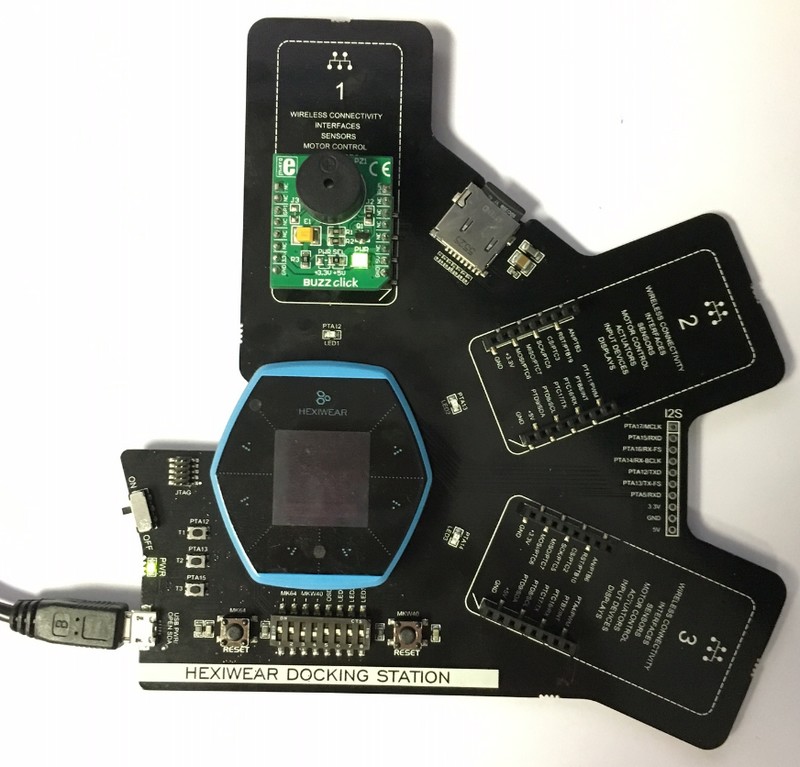Simple Click Buzzer example for Hexiwear
Dependencies: PWM_Tone_Library
This project demonstrates the use of the Mikroelektronika Click Buzzer module with hexiwear
Plug Hexiwear into the Docking Station and the BUZZER Click to the Click Socket 1
Connect the USB cable to your computer and to the micro-USB port of the Docking Station
Compile the project and copy the binary "Hexi_Click_Buzzer_Example_HEXIWEAR.bin" in the DAP-LINK drive from your computer file explorer
Press the K64F-RESET button on the docking station to start the program on your board
The buzzer will start play a melody of 32 tones

main.cpp
- Committer:
- GregC
- Date:
- 2016-09-20
- Revision:
- 0:13eb53d1b502
File content as of revision 0:13eb53d1b502:
#include "mbed.h"
#include "pwm_tone.h"
PwmOut Buzzer(PTA10);
float C_3 = 1000000/Do3,
Cs_3 = 1000000/Do3s,
D_3 = 1000000/Re3,
Ds_3 = 1000000/Re3s,
E_3 = 1000000/Mi3,
F_3 = 1000000/Fa3,
Fs_3 = 1000000/Fa3s,
G_3 = 1000000/So3,
Gs_3 = 1000000/So3s,
A_3 = 1000000/La3,
As_3 = 1000000/La3s,
B_3 = 1000000/Ti3,
C_4 = 1000000/Do4,
Cs_4 = 1000000/Do4s,
D_4 = 1000000/Re4,
Ds_4 = 1000000/Re4s,
E_4 = 1000000/Mi4,
F_4 = 1000000/Fa4,
Fs_4 = 1000000/Fa4s,
G_4 = 1000000/So4,
Gs_4 = 1000000/So4s,
A_4 = 1000000/La4,
As_4 = 1000000/La4s,
B_4 = 1000000/Ti4,
C_5 = 1000000/Do5,
Cs_5 = 1000000/Do5s,
D_5 = 1000000/Re5,
Ds_5 = 1000000/Re5s,
E_5 = 1000000/Mi5,
F_5 = 1000000/Fa5,
Fs_5 = 1000000/Fa5s,
G_5 = 1000000/So5,
Gs_5 = 1000000/So5s,
A_5 = 1000000/La5,
As_5 = 1000000/La5s,
B_5 = 1000000/Ti5;
int tones[] = {E_4, D_4, C_4, D_4, E_4, E_4, E_4, 0, D_4, D_4, D_4, 0, E_4, G_4, G_4, 0,
E_4, D_4, C_4, D_4, E_4, E_4, E_4, 0, D_4, D_4, E_4, D_4, C_4, 0, 0, 0};
int tones_num = 32; // Auto performance
int i;
// main() runs in its own thread in the OS
// (note the calls to Thread::wait below for delays)
int main() {
Tune(Buzzer, C_4, 4); //4 Octave C beat 4/16
wait_ms(250);
Tune(Buzzer, D_4, 4); //4 Octave D beat 4/16
wait_ms(250);
Tune(Buzzer, E_4, 4); //4 Octave E beat 4/16
wait_ms(250);
for(i=0; i<tones_num; i++)
{
Auto_tunes(Buzzer, tones[i], 4); // Auto performance
Stop_tunes(Buzzer);
}
}